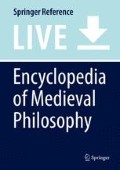Abstract
In the High Middle Ages, a distinctive Christian approach to economics starts to take form in relation to ecclesiastical properties. A paradigm of unselfish but productive use of wealth is set, using poverty as a model. From the eleventh century, canon law unfolds this broad paradigm drawing on Roman law: a juridical condemnation of usury is put forward which, however, is linked to derogations grounded on nonlegal principles.
Bibliography
Primary Sources
al-Dimashqī Jafar, Kitab al-Ishara ila Mahasin al-Tijara. In H. Ritter (Ed.), Ein Arabisches Handbuch der Handelswissenschaft. Der Islam, 7, 1–19 1917.
Aquinas, T. (1895). Summa theologiae, ii–ii. In T. Aquinas (Ed.), Opera omnia (vol. 8). Rome: Apud sedem Commissionis Leoninae.
Duns Scotus John. (2001). Opus oxoniensis, IV, 15. In A. B. Wolter (Ed.), Duns Scotus political and economic philosophy. St. Bonaventure: The Franciscan Institute.
Epstein, I. et al. (Ed.). (1935–1948). The Babylonian Talmud (35 vols.). London: Soncino.
Friedberg, A. (Ed.). (1922). Corpus Iuris Canonici (2 vols.). Leipzig: Bernard Tauchnitz.
Henry of Ghent. (1979). Opera omnia (Vol. 5; ed.: Macken, R.). Leuven: Leuven University Press.
Henry of Susa. (1574). Summa aurea. Venice: Apud Iacobum Vitalem.
Khaldun, I.. (1958). “The Muquaddimah”: An introduction to history (3 vols.), New York: Pantheon.
Maimonides. (1988–2002). Mishneh Torah (26 vols.; ed.: Tougher, E.). New York: Moznam.
Olivi, P.. (2016). A treatise on contracts (ed.: Piron, S.). St. Bonaventure: The Franciscan Institute.
Raymond of Peñafort. (1976). Summa de paenitentia (eds.: Ochoa, X. & Diez, A.) Rome: Commentarium pro religiosis.
Rushd, I.. (2000). The distinguished jurist’s primer: Bidayat alMujtahid (2 vols.; eds.: Ahsan Khan Nyazee, I. & Abdul–Rauf, M.). Reading: Garnet.
Secondary Sources
Armstrong, L. (2003). Usury and public debt in early renaissance Florence: Lorenzo Ridolfi on the Monte Comune. Toronto: Pontifical Institute of Mediaeval Studies.
Armstrong, L. (2016). The idea of a moral economy: Gerard of Siena on usury, restitution, and prescription. Toronto: University of Toronto Press.
Ceccarelli, G. (2001). Risky business. Theological and canonical thought on insurance from the thirteenth to the seventeenth century. Journal Medieval Early Modern Studies, 31(3), 602–652.
Ceccarelli, G. (2006). Whatever economics’: Economic thought in Quodlibeta. In C. Schabel (Ed.), Theological Quodlibeta in the middle ages: The thirteenth century (pp. 475–505). Leiden: Brill.
Ceccarelli, G., & Piron, S. (2009). Gerald Odonis’ economics treatise. Vivarium, 47, 164–204.
Ghazanfar, S. M. (Ed.). (2003). Medieval Islamic economic thought: Filling the great gap in European economics. London: Routledge.
Johansen, B. (1999). Contingency in a sacred law: Legal and ethical norms in the Muslim Fiqh. Leiden: Brill.
Kaye, J. (1998). Economy and nature in the fourteenth century: Money, market exchange, and the emergence of scientific thought. Cambridge: Cambridge University Press.
Kaye, J. (2014). A history of balance, 1250–1375: The emergence of a new model of equilibrium and its impact on Medieval thought. Cambridge: Cambridge University Press.
Lambertini, R. (1994–1997). Usus and usura: Poverty and usury in the Franciscans’ responses to John XXII’s Quia vir reprobus. Franciscan Studies, 54, 185–210.
Langholm, O. (1992). Economics in the medieval schools. Wealth, exchange, value, money and usury, according to the Paris theological tradition, 1200–1350. Leiden: Brill.
Langholm, O. (2003). The merchant in the confessional. Trade and price in the pre-reformation penitential handbooks. Leiden: Brill.
Naismith, R. (2015). Turpe lucrum? Wealth, money and coinage in the millennial church. In G. E. M. Gasper & S. H. Gullbekk (Eds.), Money and the Church in Medieval Europe, 1000–1200: Practice, morality and thought (pp. 17–37). Farnham: Ashgate.
Ohrenstein, R. A., & Gordon, B. (1992). Economic analysis in Talmudic literature. Rabbinic thought in the light of modern economics. Leiden: Brill.
Soloveitchik, H. (2005). The Jewish attitude in the high and late middle ages (1000–1500). In D. Quaglioni, G. Todeschini, & G. M. Varanini (Eds.), Credito e usura fra teologia, diritto e amministrazione. Linguaggi a confronto (secc. XII–XIV) (pp. 115–127). Rome: École Française de Rome.
Todeschini, G. (2004). Franciscan economics and Jews in the middle ages: From a theological to an economic lexicon. In S. J. McMichael & S. E. Myers (Eds.), Friars and Jews in the middle ages and renaissance (pp. 99–117). Leiden: Brill.
Todeschini, G. (2008). Theological roots of the medieval/modern merchants’ self-representation. In M. C. Jacob & C. Secretan (Eds.), The self-perception of early modern capitalists (pp. 17–46). New York: Palgrave-MacMillan.
Todeschini, G. (2009). Franciscan wealth: From voluntary poverty to market society. Saint Bonaventure: Franciscan Institute.
Vogel, F. E., & Hayes, S. L., III. (1998). Islamic law and finance: Religion, risk, and return. Leiden: Brill.
Wood, D. (2002). Medieval economic thought. Cambridge: Cambridge University Press.
Author information
Authors and Affiliations
Corresponding author
Editor information
Editors and Affiliations
Rights and permissions
Copyright information
© 2018 Springer Science+Business Media B.V.
About this entry
Cite this entry
Ceccarelli, G. (2018). Economic Thought in the Middle Ages. In: Lagerlund, H. (eds) Encyclopedia of Medieval Philosophy. Springer, Dordrecht. https://doi.org/10.1007/978-94-024-1151-5_152-2
Download citation
DOI: https://doi.org/10.1007/978-94-024-1151-5_152-2
Received:
Accepted:
Published:
Publisher Name: Springer, Dordrecht
Print ISBN: 978-94-024-1151-5
Online ISBN: 978-94-024-1151-5
eBook Packages: Springer Reference Religion and PhilosophyReference Module Humanities and Social SciencesReference Module Humanities

